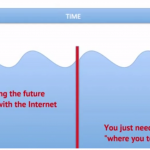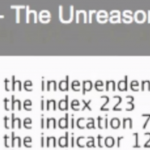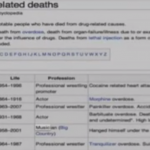Our Marketing Director, Dixon gave a top class presentation at BrightonSEO (not being biased of course), which is above and I have summarized the ideas in my own words. The presentation challenges SEO’s to retrieve valuable data and think outside the box instead of simply manipulating Google. Furthermore, it will help you to use your initiative, be creative and stay ahead of the game as well as implement and achieve strategies with small budgets.
Predicting the future is easy. “How?” I hear you ask. Well, this can be achieved in two ways:
- It’s about knowing that history repeats itself; and
- knowing where you are on the curve
As Brits, we should be good or at least better than the Americans (sorry America!) at predicting as we have more history to base on. There are times when it is easy to predict just like Google does when it makes suggestions as we type into the search box. You may be wondering “How do they know what’s inside my mind?”. Google is getting better at reading our minds.
Predicting what a user is about to type was covered by Peter Norvig during one of his talks at UBC when he showed how Google counts the number of tokens of phrases that appear on the internet. He also went on to talk about how Google calculates the number of unigrams, bigrams & trigrams amongst other points. These are are one word, two word or three word chains that appear on the world wide web. Once they are counted and given a value for each phrase and sentence, it becomes straightforward to predict what someone will be interested in. For example, “serve as the independent” phrase appears 794 times in contrast to “serve as indicator”, which appears 120 times. Therefore, it would be sensible to assume that any one person is more likely to search for “serve as the independent”.
Google also modifies searches. For instance, it would know if a searches wants a location modifier. Additionally, Google is aware of a user’s history, such as personal habits and so, therefore would use a personal habits modifier to predict what a user is after.
From the video you can see that if one should type ‘Dixon J’ in UK, Google would assume that “Dixon Jones” wants to come up as number 1, whereas type the same in US and it would assume that the user is after Dixon Jets, so that would come up as number 1 in the search. While these results appear, Google can bring in other ideas based on modifiers.
From this we can see that Google is very good at guessing what you want in the very short term future and the proxy is pretty strong too, as if you get a search term wrong for a considerable amount of times, Google will figure out what it is you’re looking for. For instance, Google will know that you are looking for results relating to ‘Predictive Analytics’ instead of ‘Predictive Analytocs’.
However, predicting something that is ABOUT to happen is quite something else…hold on tight to your seats. It would have been hard to predict Whitney Houstons death, yet BBC broke this story… but, only 27 minutes after Twitter broke the headline.
Interestingly, money can be made by doing this as demonstrated by a company called ‘Visual Revenue’ run by Dennis Mortensen. They take social signals that people are talking about on social media and feeds it into news desk for editors use. Someone who performs this task very well goes by the name of Malcolm Coles. He makes good effort to take tweets and trends and writes about them. His most famous work was his article on Pippa Middleton’s knickers!
But, we could have worked this out by looking back at history. For example, we are well aware of the fact that many from the music industry have lost their lives due to drugs. This can be viewed at a Wikipedia page. A search can be done on the page to see how often the word ‘music’ appears within the term ‘drugs’. It turns out that it appears 97 times, therefore 97 people in the music industry have been victims of drugs.
There are loads of data out there that can be used for different reasons, such as tracking brand power on a daily basis among other reasons. Using such data, we can perform interesting analysis and possibly predict the future. Moreover, this idea can used to work out market share of competitors within software, so you can compare competitors on a daily basis. Here we take Adobe as an example. Dixon, our Marketing Director worked for them while ago. For his task, he first looked at Adobes market share, what products they were selling against among other factors. He then went on download.com. They have the option to download information daily. Using this site, he found out that 6.8 million people downloaded Adobe’s Acrobat Pro. All the customers receive 30 day free trial with these products, so before they paid any fees to Adobe, they downloaded products and made use of a trial for 30 days. Afterwards, Dixon went to Odesk and got programming, which took all products of 1 one of Adobe’s competitors and looked them up every day on download.com. The number of downloads made were recorded. Not only could Dixon see the market share, but could see the trend of time. Now, Dixon had the inside information of the business 30 days before the account had been finished and so knew what sales would be like in 30 days time.
It is even easier for an SEO company to predict when a company will crash, whether that be a down fall in share prices or business models.
Dixon rounded off the presentation recapping how Majestic’s link data was used to predict the outcome of the Obama – Romney US Presidential election.
BrightonSEO was a huge success and if you are interested in attending more talks by Dixon Jones, then by all means please attend any of the events that we will be participating in. More event details can be found here.
- Majestic Historic Index – normalising builds. - March 5, 2020
- Majestic Historic Index – Reflecting on 2019 & looking forward to 2020. - November 11, 2019
- Introducing Related Sites. Find similar websites using Majestic - October 25, 2019










predictions are for those who have a tool – the brain
April 25, 2013 at 9:53 amThis is why SEO is always nice because is changing and you have no time to get bored
April 25, 2013 at 10:19 pmYes, Brits should be far better than Yanks when comes to prediction. The only problem is nobody has time to perform reliable prediction these days 🙂
April 26, 2013 at 6:28 amMy brain was completely fuddled after I read “Pippa Middletons knickers”lol
April 26, 2013 at 9:19 pmIm impressed that such is possible with just nothing more than backlinks.
But what would be possible with fulltext data analysis ?
April 27, 2013 at 10:32 am